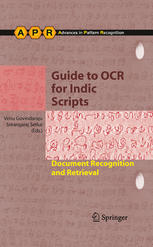

Most ebook files are in PDF format, so you can easily read them using various software such as Foxit Reader or directly on the Google Chrome browser.
Some ebook files are released by publishers in other formats such as .awz, .mobi, .epub, .fb2, etc. You may need to install specific software to read these formats on mobile/PC, such as Calibre.
Please read the tutorial at this link: https://ebookbell.com/faq
We offer FREE conversion to the popular formats you request; however, this may take some time. Therefore, right after payment, please email us, and we will try to provide the service as quickly as possible.
For some exceptional file formats or broken links (if any), please refrain from opening any disputes. Instead, email us first, and we will try to assist within a maximum of 6 hours.
EbookBell Team

4.3
8 reviewsOptical Character Recognition (OCR) is a key enabling technology critical to creating indexed, digital library content, and it is especially valuable for Indic scripts, for which there has been very little digital access.
Indic scripts, the ancient Brahmi scripts prevalent in the Indian subcontinent, present some challenges for OCR that are different from those faced with Latin and Oriental scripts. But properly utilized, OCR will help to make Indic digital archives practically accessible to researchers and lay users alike by creating searchable indexes and machine-readable text repositories.
This unique guide/reference is the very first comprehensive book on the subject of OCR for Indic scripts, providing an overview of the state-of-the-art research in this field as well as other issues related to facilitating query and retrieval of Indic documents from digital libraries. All major research groups working in this area are represented in this book, which is divided into sections on recognition of Indic scripts and retrieval of Indic documents.
Topics and features:
This is an excellent reference for researchers and graduate students studying OCR technology and methodologies. This volume will contribute to opening up the rich Indian cultural heritage embodied in millions of ancient and contemporary documents spanning topics such as science, literature, medicine, astronomy, mathematics and philosophy.
Venu Govindaraju FIEEE FIAPR, is a Distinguished Professor of Computer Science and Engineering at the University at Buffalo. He has over 20 years of research experience in pattern recognition, information retrieval and biometrics. His seminal work on handwriting recognition was at the core of the first handwritten address interpretation system used by the U.S. Postal Service.
Srirangaraj Setlur SMIEEE, is a Principal Research Scientist at the University at Buffalo. He has over 15 years of research experience in pattern recognition that includes NSF sponsored work on multilingual OCR technologies for digital libraries and other applications. His work on postal automation has led to technology adopted by the U.S. Postal Service, and Royal Mail in the U.K.